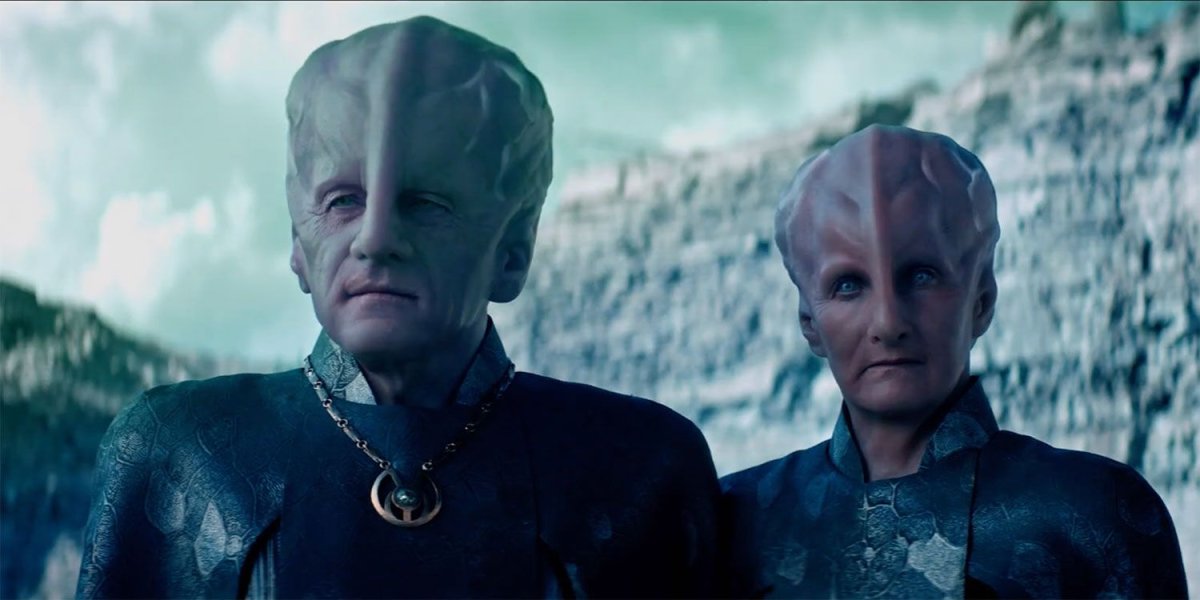"If Memory Serves," the latest episode of Star Trek: Discovery, made some of the most consequential emotional changes to the Star Trek timeline since The Next Generation revised Tasha Yar's death in "Yesterday's Enterprise," retooling The Original Series' relationship between Captain Pike and Vina, who crash landed on Talos IV before the Enterprise first visited the planet in the original pilot episode, "The Cage."
In "If Memory Serves," the fugitives Michael Burnham (Sonequa Martin-Green) and Spock (Ethan Peck) go to Talos IV in an attempt to restore Spock's sanity. The resident Talosians are powerful psychic beings—as the large, veined foreheads might indicate—who create illusory realities and enjoy the painful memories of other species. There they meet Vina, who acts as a guide and liaison between them and the Talosians.

On Talos IV, we learn a lot about the Red Angel and the apocalyptic future timeline it's hoping to avert, but it's the reunion of Captain Christopher Pike (Anson Mount) and Vina (Melissa George) that represents a remarkable crossover between the oldest and newest iterations of Star Trek.
Midway through "if Memory Serves," Vina suddenly appears in Captain Pike's ready room, a psychically projected by the Talosians to connect Burnham with the Discovery without alerting the clandestine Section 31, who are monitoring their communications in the hopes of capturing Spock. Pike is shocked to see her.
"When you came to Talos, I'd been alone for so many years. I never imagined happiness, or love," she says. "When you left, it was worse."
"I've thought about you—us—often, and wish that you had come with me," Pike says. It's an admission of regret made decades later, at least from our perspective.
In "The Cage," the Enterprise follows a landing party to the surface of Talos IV and the Talosians lure Captain Pike (Jeffrey Hunter) into their private specimen collection. There, they hope to feed on the emotional experiences he'll share with their other captive, Vina (Susan Oliver), eventually using them as slave stock to rebuild their crumbling world. Pike refuses to play the Talosians' games and is bombarded with psychic torment—a sci-fi reskin of Christian morality stories about bargains with the devil, complete with discussions of the worth of a man's soul, lustful temptations and burning hellfire. Vina is the tempting fruit at the heart of the story, appearing as an Orion sex slave and damsel in distress to test Pike's resolve. In the end, the Talosians set Pike loose, but keep Vina, who wishes to stay behind to maintain the illusory beauty they've provided her. Her only recompense: an illusory Pike as her mate.
"She has an illusion and you have reality," a Talosian tells Pike as Vina returns to captivity. "May you find your way as pleasant."
It's a queasy ending, depicted as an unambiguously happy one in "The Cage." Star Trek: Discovery complicating this history is a fascinating way to forever change Star Trek, not through huge events like the war with the Klingons, but through the reevaluation of a past decision in a new light.
By the end of "If Memory Serves," Vina hasn't been rescued from the Talosians, but she does help remind Captain Pike of Star Trek's human stakes. When faced with a decision to rescue or abandon his friends to Section 31, Vina and Pike make a new choice together: this time it's the illusions that will be left behind.
It's a small, but very real, recompense for one of Star Trek's least admirable initial qualities: it's lack of well-developed women characters. When Gene Roddenberry first pitched the series, Captain Robert April (later Pike) was "colorfully complex, capable of action and decision … lives a continual battle of self-doubt and the loneliness of command," while Dr. "Bones" Boyce (later McCoy) was "humorously cynical… enjoys his own weaknesses." It was a stark contrast with how Roddenberry first described the first officer Number One (played by Majel Barrett in the original pilot, the role is reprised by Rebecca Romijn in Discovery): "a mysterious female, slim and dark, expressionless, cool, one of those women who will always look the same between years 20 and 50." When Star Trek was first conceived, the men had interiority, while the women had timeless looks.
This isn't the first time Star Trek has rewritten one of its character's resolutions to powerful effect. After killing Enterprise chief of security killing Tasha Yar (Denise Crosby) in a first-season episode—an ignominious and poorly written death at the hands of a trash bag slime monster—The Next Generation revisited her end in Season 3 episode "Yesterday's Enterprise." Thanks to multiple dimension hijinks, Tasha Yar is given a new death: fighting an honorable lost cause. By its episode's end, the "normal" Star Trek timeline was restored and a new end was written for a character that always deserved better.
Its diversity is already one of Star Trek: Discovery's great strengths, but there's something just as heartening to be found in the realization that a series can look at its own past and decide that an old outcome just wasn't good enough and must not be allowed to stand.
The next episode of Star Trek: Discovery, "Project Daedalus," premieres March 14 on CBS All Access.
Uncommon Knowledge
Newsweek is committed to challenging conventional wisdom and finding connections in the search for common ground.
Newsweek is committed to challenging conventional wisdom and finding connections in the search for common ground.
About the writer
To read how Newsweek uses AI as a newsroom tool, Click here.








